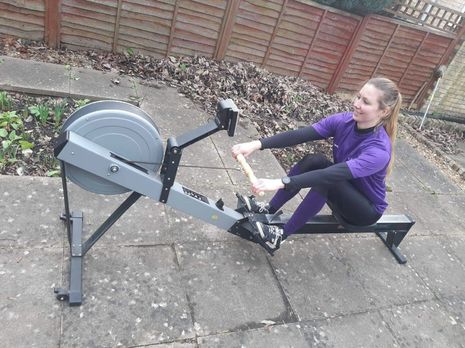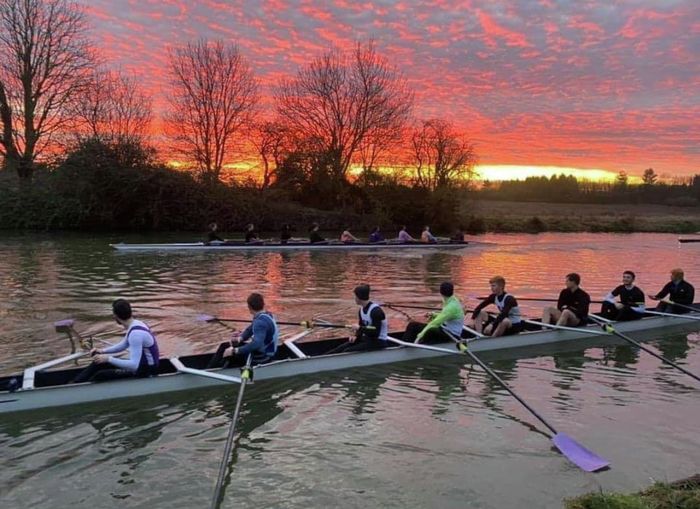King’s Boat Club cover one million metres for charity
Despite being strewn across the country, King’s W1 captain Amanda McHugh tells Beth Wright about the team’s charitable endeavours.

Boat clubs across Cambridge currently lie empty; eights, fours and sculls sit dry and scattered across the country, once close-knit teams. However, at King’s, the Women’s side has decided to take COVID-19 rowing into their own hands, by covering one million metres for charity, led by their captain Amanda McHugh. Varsity spoke with her to find out more about the fantastic work going on off the River Cam.
“Separated from their teammates by miles and masks, the King’s Women remain accountable to their crew.”
Amanda describes her project as a relatively straightforward group distance challenge, but one that her team have reimagined in their own unique way. The teams’ task is to complete one million metres over four weeks through various methods, ranging from roller-skating to rowing. This mammoth task runs alongside their goal to generate money for three homeless charities based in Cambridge: Cambridge Cyrenians, Winter Comfort and Jimmy’s Cambridge. This challenge captures the unique nature of rowing as a sport. Team members complete individual runs, rows and cycles, hitting personal milestones and targets on the way. However, the goal that matters is how these distances accumulate as a team. Separated from their teammates by miles and masks, the King’s Women remain accountable to their crew.
For King’s, as for all boat clubs, lockdowns have not been easy and have been defined by trial and error. In the now novel first lockdown, the women’s side completed regular circuits over Zoom, occasionally collaborating with the men’s side, in an attempt to retain the fitness and form that had been diligently built over the preceding months. However, as with many Zoom operations, the circuits faded out over the summer, and many members of the Boat Club graduated. On returning to the club, fours could push off the hard and rowers, old and new, learned how to scull.
Nevertheless, with a relatively small club, and ever-changing government and British Rowing guidelines, the King’s Women’s side was left fragmented and without clear direction. The ‘One Million Metres’ challenge has changed this, as rowers, united by Facebook group chats and Strava accounts, accumulate metres together. The challenge began with just the members of the W1 boat, yet thanks to their success and enthusiasm, the rest of the women’s side have got involved, allowing King’s to integrate freshers into their rowing community – something many clubs have struggled with.
“Amanda and her teammates are working to use their visibility to champion the invisible, acknowledging their privilege as heavily subsidised rowers as they do so.”
Thanks to King’s College, many of the rowers have access to ergs – meaning most of the metres have been accumulated on rowing machines. With much of the women’s side in Cambridge, pairs from the club have been able to go on cycles, runs, roller-skates and 15 km walks, within government guidelines of course. In just a week, 291,278 metres had been accumulated and, with less than a week to go, the rowers have only 24,102 metres left to cover: the equivalent of walking the length of King’s College Chapel 274 times.
Amanda spoke of how visible homeless people are in Cambridge, yet how often they are treated as invisible. In comparison, Cambridge rowers, travelling through the city every morning, are a consistently recognised feature of Cambridge’s external image. Amanda and her teammates are working to use their visibility to champion the invisible, acknowledging their privilege as heavily subsidised rowers as they do so. The King’s women’s side recognise where they stand in the community, and have used their ability as athletes to help make homelessness more visible and alter the lives of those without homes throughout the city. To Amanda, the ‘One Million Metres’ challenge has proved to her that you can always make a difference, and that difference can be all the more remarkable if it is achieved within a team.
The forecast for rowing at Cambridge under the cloud of COVID-19 remains uncertain. Yet to Amanda and her crewmates, Coronavirus has fostered a new found love for the sport — whether that be speeding down the reach in an eight, or fumbling around with two blades in a scull. Amanda spoke of a general greater appreciation of simply being out on the water that she is sure will no longer be taken for granted. Considering rowing’s financial costs, our position in Cambridge to have consistent and inclusive access to rowing is a distinct privilege, that Amanda believes we should be far more grateful for. With the conventional collegiate form of rowing – eights – taken from them, the King’s side learned to be curious about other forms of the sport and to genuinely enjoy a group erg in their college’s famous grounds.
Alongside the phenomenal fundraising benefits of this challenge, the ‘One Million Metres’ campaign generates many advantages for both the women’s physical and mental health. Lockdown(s) have left many people, particularly athletes, feeling unanchored and adrift, without clear goals and targets for the development. ‘One Million Metres’ changed this for King’s. With a clear goal and target, the women are pushed to do something and are given motivation not only for themselves and their team but for a good cause. In Amanda’s words, this most recent lockdown has been particularly deleterious to drive, as people have felt unable to make a difference with cases ever-rising, and the light of hope dimming at the end of the tunnel. King’s women, however, have refused to give up hope and have proven, from ergs in their kitchen and footsteps along the Cam, both the ability and responsibility of sports teams to fundraise.
 News / Clare Hall spent over £500k opposing busway 24 December 2025
News / Clare Hall spent over £500k opposing busway 24 December 2025 Comment / The ‘class’ of Cambridge24 December 2025
Comment / The ‘class’ of Cambridge24 December 2025 News / Caius mourns its tree-mendous loss23 December 2025
News / Caius mourns its tree-mendous loss23 December 2025 Comment / Yes, I’m brown – but I have more important things to say22 December 2025
Comment / Yes, I’m brown – but I have more important things to say22 December 2025 News / Girton JCR publishes open letter expressing solidarity with Palestine25 December 2025
News / Girton JCR publishes open letter expressing solidarity with Palestine25 December 2025










